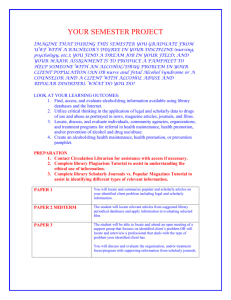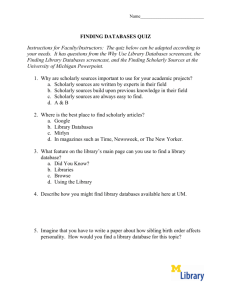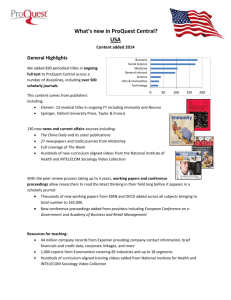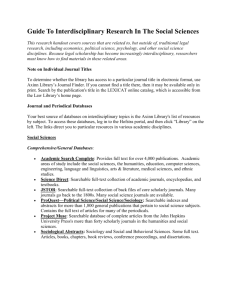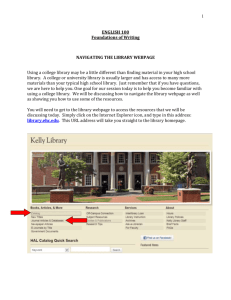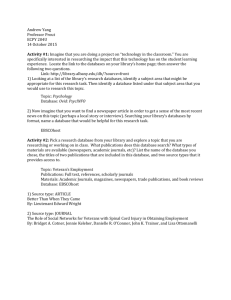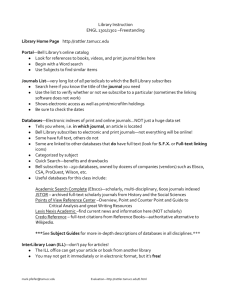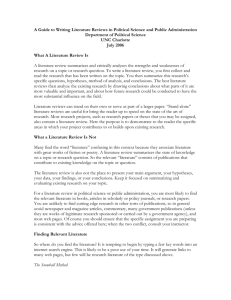Class 10
advertisement
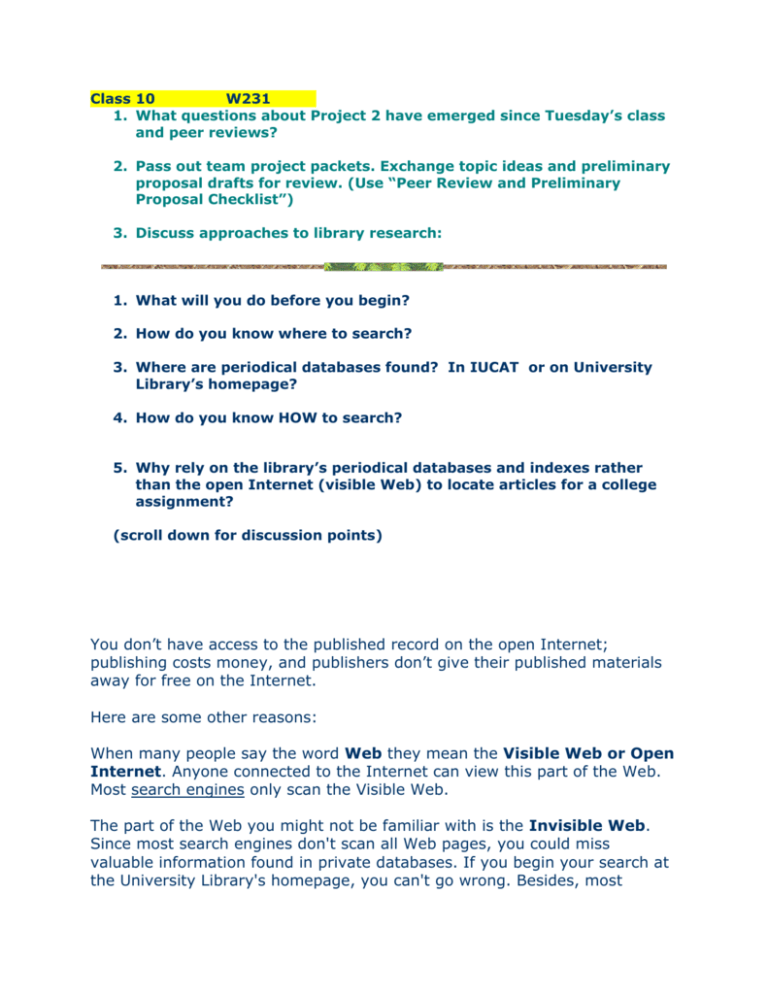
Class 10 W231 1. What questions about Project 2 have emerged since Tuesday’s class and peer reviews? 2. Pass out team project packets. Exchange topic ideas and preliminary proposal drafts for review. (Use “Peer Review and Preliminary Proposal Checklist”) 3. Discuss approaches to library research: 1. What will you do before you begin? 2. How do you know where to search? 3. Where are periodical databases found? In IUCAT or on University Library’s homepage? 4. How do you know HOW to search? 5. Why rely on the library’s periodical databases and indexes rather than the open Internet (visible Web) to locate articles for a college assignment? (scroll down for discussion points) You don’t have access to the published record on the open Internet; publishing costs money, and publishers don’t give their published materials away for free on the Internet. Here are some other reasons: When many people say the word Web they mean the Visible Web or Open Internet. Anyone connected to the Internet can view this part of the Web. Most search engines only scan the Visible Web. The part of the Web you might not be familiar with is the Invisible Web. Since most search engines don't scan all Web pages, you could miss valuable information found in private databases. If you begin your search at the University Library's homepage, you can't go wrong. Besides, most professors expect students to begin searching for scholarly sources by using library databases on the Invisible Web. University Library has a large collection of information on a variety of carefully selected and organized topics. The key idea when using the library over the web is that you are getting quality over quantity. Print or electronic library resources are the best sources to use when starting your research. You'll always find high quality information from a variety of credible sources in University Library. Most information on the Web does not go through a review process. Anyone can publish on the Web without passing the content through an editor. Pages might be written by an expert on the topic, a journalist, a disgruntled consumer or even a child. Some information on the Web is not free. Many Web pages are free to view, but some commercial sites will charge a fee to access their information. Information on the Web is not organized. Some directory services, like Yahoo, provide links to sites in subject lists. But there are too many Web pages for any single directory service to organize. Most information on the Web is not comprehensive. Rarely will you be able to use a search engine on the Web to collect information about your topic from earlier decades and different types of sources. Most information on the Web is not permanent. Some well-maintained sites are updated with very current information, but other sites may become quickly dated or disappear altogether without much of a notice. Library information sources go through a review process. Librarians select books, magazines, journals, databases, and Web sites. The library collects sources considered reliable, historically relevant, and valuable. Library information sources are free University Library is able to purchase one copy which can be used by many students, faculty, staff, and community members. Library information sources are organized. Items are organized so you can find all the sources on a topic. For example, when you search for a book in the IUCAT you will get a call number. The books shelved near the call number will cover a similar topic. Library information sources are meant to be kept permanently. A primary function of a library is to be an organized storehouse of information published throughout time. So, not only can you find current information, you can also find books that are no longer published and older issues of periodicals. Library information sources come with personal assistance. University Library has reference staff that are trained to help you. They'll help you learn to use print and online resources. They'll be happy to answer any questions that you have about the library or its resources. 6. Where are the periodical databases found? 7. What are you trying to find? For our W231 team projects, you’ll want to find materials that meet the following criteria? They are recently published. They are found in scholarly or trade journals They are narrowly focused on the problem you’re investigating. Their main focus is on strategies and solutions. They are available in print form (even if you accessed them electronically). NOT – Their primary focus is to confirm that the problem exists They all come from one or two journals as opposed to a variety of sources. They are lengthy articles or books on the broad topic your problem falls under. They were published by your target audience’s organization. 8. What is the difference between popular sources and scholarly sources? 9. Which of the following should you consider when evaluating the credibility of a source? Check all that apply. ____author ____ date published ___objectivity (fact/opinion) ____type: scholarly or popular 10. Websites with which domain name would be most likely to contain reliable, unbiased information? ____ .com ____ .edu ___.mil ___.org ___ .net 11. Which of the following can you find in IUCAT? ____ titles of books 12. ____ titles of journal articles ____ titles of journals Are all of the articles listed in a periodical index or database available at our library? Databases quickly scan thousands of periodical article records that match your search terms. Not all of these articles will be available in University Library. 13. What if you can’t get a full text article to print out? Click on “find it” and view a list of services available for that article. This may include its online full-text version, among other resources. Checking holdings in IUCAT is just one of the options. Using Boolean operators (AND, OR, NOT), write a sample search statement for your proposed topic: (not the research question; the statement you would enter into the box when performing a search). AND – limits by inclusion NOT— limits by exclusions OR -- expands Preliminary proposals are due Sunday evening. Guidelines are under Tools and in your pink booklet. Teams form Tuesday!

